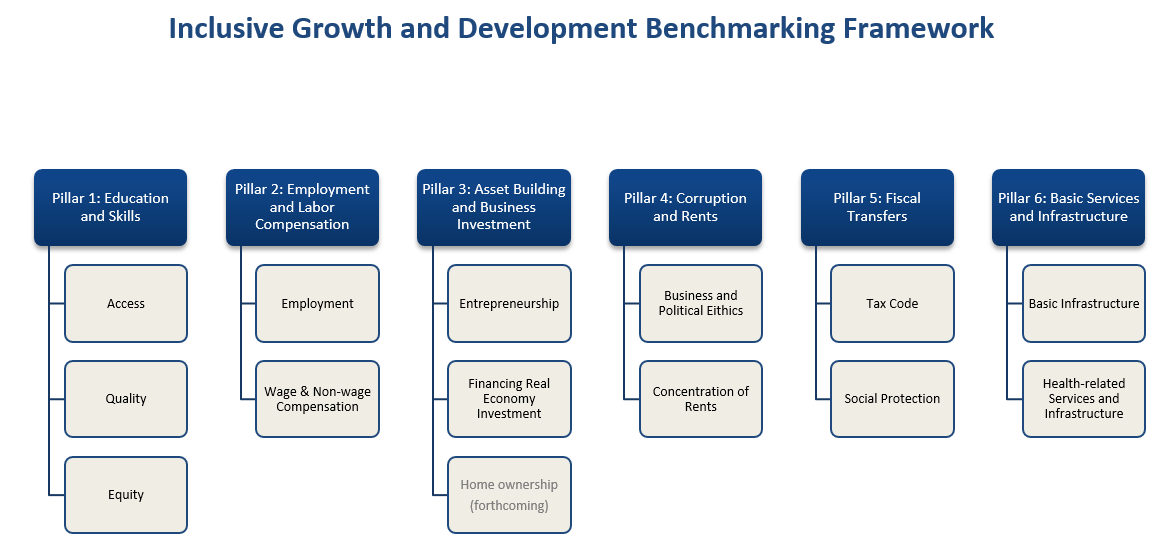What is the key to inclusive growth?


Get involved with our crowdsourced digital platform to deliver impact at scale
Stay up to date:
Economic Progress
As we meet this year in Davos, the challenge of rising income inequality is likely to figure prominently in the discussions, reflecting concern about not only social and political unrest but also long-term damage to economies. This has become an increasingly important focus for political and business leaders in developed and developing countries alike. It has topped the World Economic Forum’s Global Risks Report survey in recent years, with CEOs in the Forum’s International Business Council echoing the need for action. But while there is widespread international consensus on the need to develop new and improved growth and development models, little in the way of concrete policy guidance has emerged.
Traditional measures of economic performance including GDP and the Gini coefficient have become insufficient in that they fail to give a complete picture of living standards and what needs to be done to improve them. To date, the debate over how to respond to inequality has focused narrowly on redistribution and education. But a wider perspective is necessary if we are to make progress on one of the most complex and pressing challenges of our time. Building on the strength of the Forum’s special competence in cross-country benchmarking, we have begun to develop a new analytical framework and identify evidence-based solutions suited to this purpose.
Making inclusive growth a reality
Consisting of six policy domains and fourteen subdomains, the Inclusive Growth and Development framework we outline in a preliminary Discussion Paper issued this week identifies a broad spectrum of policy incentives and institutional mechanisms that have a bearing on the inclusivity of growth.
This multidimensional framework includes areas such as creating an enabling environment for human capital formation, reinforcing the wage and productivity growth link, fostering entrepreneurship and investment, reinforcing business and political ethics, promoting gender parity, reviewing fiscal policy (tax code and social protection), and providing improved public services and infrastructure. The breadth of the framework reinforces the idea that there is no single silver bullet and a given policy domain cannot be viewed in isolation but is inter-connected with many other policy domains — they tend to reinforce each other, and a weakness in one area often has a negative impact in others.
The tool aims to better inform policymakers, business leaders and other stakeholders by giving them a clearer sense of the extent to which their country is exploiting the available policy space and “best practices” based on the recent experience of its peers. Initial findings indicate that there is significant room for improvement in one or more policy domains for nearly all countries at every stage of development. This will be an important topic for discussion here in Davos this week that we will then carry out throughout the year. By leveraging our global platforms to convene key experts and decision makers from multiple policy domains and countries for a structured series of evidence-based discussions, we hope to contribute to a better appreciation within societies of how the desire for a more inclusive model of economic growth and development can be translated into a practical national or regional strategy. This would provide the practical foundation required to push the agenda forward and make inclusive growth a reality rather than an aspiration.
Author: Gemma Corrigan, Senior Project Associate, Inclusive Growth, World Economic Forum
Image: Office blocks are seen in the Canary Wharf business district in London January 19, 2009. REUTERS/Stephen Hird
Don't miss any update on this topic
Create a free account and access your personalized content collection with our latest publications and analyses.
License and Republishing
World Economic Forum articles may be republished in accordance with the Creative Commons Attribution-NonCommercial-NoDerivatives 4.0 International Public License, and in accordance with our Terms of Use.
The views expressed in this article are those of the author alone and not the World Economic Forum.
Related topics:
The Agenda Weekly
A weekly update of the most important issues driving the global agenda
You can unsubscribe at any time using the link in our emails. For more details, review our privacy policy.
More on Economic ProgressSee all
Joe Myers
April 12, 2024
Joe Myers
April 5, 2024
Pooja Chhabria
March 28, 2024
Kate Whiting
March 28, 2024
Joe Myers
March 28, 2024
Andrea Willige
March 27, 2024







